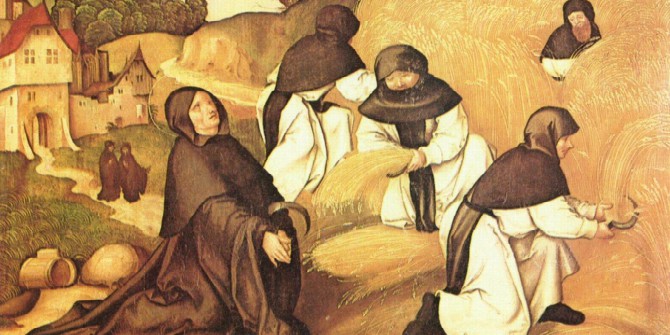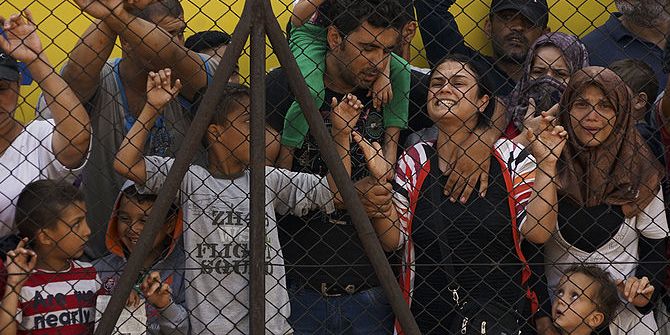A University of Bristol team has researched the use of religious community mechanisms as a means of securing justice for victims of domestic violence. Often a first point of contact for those who have experienced abuse, faith institutions can play a crucial part in obtaining justice. They can also fail in this duty. Natasha Mulvihill takes the example of Catholics seeking justice through the Church and the mixed results they have had. She ends by calling for faith leaders, policy-makers and academics to continue this vital, often-overlooked conversation.

For women (and men) who practice a faith, the imam, rabbi or priest may be among the first contacts in seeking support for domestic violence and abuse (DVA). Faith communities also have the power to annul a religious marriage or grant a religious divorce through religious tribunals, councils or courts. The experience of domestic abuse victims who use these religious mechanisms has received minimal academic attention in England and Wales.
The Justice Project
Since October 2015, members of the Centre for Gender and Violence Research at the University of Bristol, in partnership with University of the West of England (UWE), Cardiff University and Women’s Aid, have been working on an Economic and Social Research Council funded project looking at how ‘justice’ is understood, sought and experienced by victim-survivors of gender-based violence (GBV). Interviews were conducted with 251 victim-survivors and over 40 practitioners working to support them. The research team was particularly interested in exploring how different social identities and inequalities intersect with the perceptions and experiences of justice – including the influence of faith.
At the Justice Project findings conference at the University of Bristol on 15 May 2018, Dr Nadia Aghtaie, Dr Hilary Abrahams and I presented our respective analysis on how far Muslim Sharia Councils, the Jewish Battei Din and Catholic Matrimonial Tribunals afford ‘justice’ to victims of DVA. I highlight here some findings from interviews with Catholic practitioners, including Diocesan safeguarding officers, an NGO worker and a Canon Lawyer (Canon law is the system of laws and legal principles made and enforced by the Catholic Church; it is not civilly binding in England and Wales).
Doctrinal justice
Two types of justice emerged from these interviews. First, Catholic practitioners talked about the role of scripture and Church teaching in constraining or facilitating justice for DVA victims, which I term ‘doctrinal justice’. Interviewees spoke of challenging a selective, literalist and transhistorical interpretation of Biblical passages which appeared to justify ‘wife abuse’. In his 2016 Apostolic Exhortation, The Joy of Love (Amoris Laetitia), Pope Francis recalls Church Canon Law 1153, saying that in cases where a spouse and children are experiencing violence and abuse, “separation becomes inevitable” and even “morally necessary” for their safety.
Yet, DVA is not grounds for annulling a Catholic marriage, unless it can be found that the abuse (or a related ‘psychic incapacity’, Canon 1095) was present at the time of the marriage vows. This is because in Catholic teaching, a marriage bond cannot be broken retrospectively: it can only be found not to have been formed at the start. So, while leaving an abusive marriage may be supported doctrinally, the victim’s ability to enter a new marriage may not.
Pastoral justice
Second, practitioners talked about the importance of affirmation from their parish priest and church community for the abuse they had experienced, which I term ‘pastoral justice’. This applied particularly where the perpetrator had an active role in the church or was held in esteem. It also applied to the administering of sacraments, including Holy Communion, which has traditionally been denied to Catholics who enter a new relationship without having received an annulment.
Again, recent writings by Pope Francis (2016) suggest that the situations of the divorced and the remarried – which will include former victims of DVA – should be carefully discerned by priests on a case-by-case basis, pastorally rather than doctrinally and canonically. Francis talks of finding ways to include rather than exclude individuals from faith practice, including linking access to the sacraments with an examination of conscience. Interviewees highlighted the differing pastoral practices of individual parish priests as a key issue, with two independently flagging a tendency towards ‘black-and-white thinking’ amongst clergy.
“I’ve told you what’s what. Done and dusted. Don’t darken my doorstep again.” There are, sadly, some priests who behave in that sort of heavy-handed way, and they don’t have the blessing of the Church when they treat people like that. (Catholic practitioner)
The risk therefore of complicity in perpetuating injustice was also identified.
Faith, feminism and DVA
Returning to the opening comment, that the place of religious courts, councils or tribunals in relation to DVA has been little researched in England and Wales: I would argue that the role of faith in both supporting adult victims of GBV and in facilitating abuse, individually and/or institutionally, is still under-explored in the English context. For example, while there is a small academic literature on ‘spiritual abuse’ within intimate relationships, this aspect is notably absent from the 2013 UK Home Office definition of DVA.
In part, this may reflect a scepticism among gender-based violence researchers towards engaging with ‘faith’, given the patriarchal foundations common to many organised religions. Among some secular and feminist academics, faith can appear irrational and intractable. References to faith and GBV are found more often in papers on ‘Black and minority ethnic’ groups or on ‘honour’-based abuse. This speaks to the assumption that faith is a ‘minority’ issue. Yet half of the victims interviewed for the Justice Project declared a faith identity, whatever their ethnicity.
More attention by policy-makers, faith leaders and academics to the dynamics of faith practice, DVA and faith institutions is needed. It is hoped that the Justice Project findings can contribute to that conversation.
About the author
Natasha Mulvihill is a Lecturer in Criminology and a researcher at the Centre for Gender and Violence Research at the University of Bristol.
Note: This piece gives the views of the author, and not the position of the LSE Religion and Global Society blog, nor of the London School of Economics.






First of all the attribution of domestic abuse is unbalanced in my view. It is taken that men are the usual perpetrators. This psychology no doubt influences policies that are biased against the men. My own observations of domestic violence in my society shows that women taking advantage of this condition are committing a great deal of injustice to fathers. Whilst violence exists a great portion of alleged violence is unsubstantiated and are in fact false but the injustice takes its place and all it requires is that a woman makes an allegation against the man and the might of the child protection system is dropped on him. The outcome is usually injustice to both the man and the children. Where the man is taking advantage of this situation the suffering is the same for the woman along with the children. The child protection system or the court is more often than not unable to determine that injustice and so the injustice takes place. The data for this situation is increasing however little is given much attention.
As for the faith individuals and organizations roles in facilitating justice, again, my experience shows that there is no such thing. I cannot speak for the Christian or the Jewish sides of the matter at this stage. However, over the last four years I have been involved with several cases of allegations of domestic abuse and resulting divorce proceedings which sought services from Imams and other Muslim religious and community leaders and institutions. Following few initial disappointing responses from these groups I contacted almost 500 British Muslim Imams and religious organizations including mosques and sharia councils. The finding was that they showed no concern for their religious or civic responsibilities and absolutely no sense of justice. They were happy to lie whenever possible, had no procedure, and no care for the law even for that matter. The true visage of this community is completed distorted. These conditions of this community of Imams and religious institutions is quite deep rooted. One such cause for this decadence of the religious people of Islam is the religious education itself. Most of them receive their religious education from what are called ‘Madrasa’ – a very early form of school of the Muslim world. The inception of these Madrasa’s go back over a thousand years. The problem is that these Madrasas never underwent the change through the ages and still remain as primitive as they were when they were first set up. This includes the doctrines and dogmas that are taught. Also, the students who usually attend these schools are from the poor end of the social strata who in many cases receive free education. Once completed their main objective is to secure positions of security and stability. The syllabus they study from has no conception of ethics and does not make them ready for the competitive world so they all set up petty religious institutions and collect donations from the people to run them in the name of some twisted Islamic notion. It is these people who are in charge of these institutions from which we are talking about getting facility of justice. The very thought or the expectation is futile given the mindset. Islam, Christianity and Judaism as well as other important religions of the world need to reconstruct their religious thought if the world is to receive any benefit from them. That is not happening because it will result in shift of powers at all levels.
I Suggest looking at the sources available on the Archdiocese of Chicagoan’s website as they are extensive:
https://protect.archchicago.org/healing-garden
https://pvm.archchicago.org/human-dignity-solidarity/domestic-violence-outreach/domestic-violence-resource-manual
https://pvm.archchicago.org/documents/87254/88701/1.1.11+Women+Healing+the+Wounds+-+National+Council+of+Catholic+Women+2015+%281%29.pdf/9f73b228-abdc-4614-890f-5ad1a7278eb2
http://www.sinbysilence.com/
Janice